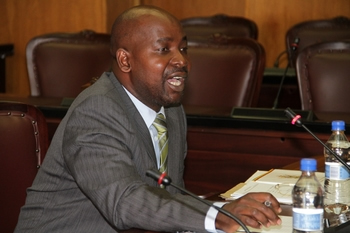ZIBF: It’s time to be ourselves
This year’s Zimbabwe International Book Fair Great Indaba Conference, which took place on July 27 and 28 in Harare, was subtly a loud cry for work to now begin towards ending mental poverty and facilitate the birth of pan-African knowledge-based economic success. On the first day, July 27, the speeches and presentations under this year’s theme “Growing the Knowledge Economy through Research, Writing, Publishing and Reading”, tackled issues which set the position of writers and publishers in the context of current African education systems and the overall creative sector.
While we got to know what is happening in countries such as Zambia and Tanzania regarding research, writing and the creative industries, hope-inspiring in its essence was the story on Zimbabwe as told in a speech by the guest of honour, Dr Lazarus Dokora, who is the Minister of Primary and Secondary Education.
The education sector is the foundation upon which knowledge is built and Dr Dokora, in his speech, opened up on what the ministry is doing in order to succeed in building knowledgeable citizens.
He said the ZIBF, which ends on Saturday August 1, is taking place at a time when the school curriculum is being reviewed by the ministry to seek new learning areas that cater for the needs of the 21st century learners.
Of note, he said, is the ministry’s proposed new leaning area called Heritage Studies which shall provide impetus for writers to utilise their skills in imparting knowledge to the people.
“The Heritage Studies seek to instil a consciousness of what we value not only from a cultural point of view but from a national perspective which says that from early age children should appreciate or cherish their heritage and natural resources such as artifacts and historic or scenic sites. As writers I believe that you have an obligation to write about these things not only for posterity but also as material for learning and teaching,” said Dr Dokora.
Among other things, Dr Dokora said his ministry has also proposed the introduction of literature in indigenous languages as a separate discipline at secondary school level.
“This calls for the provision of novels, anthologies, liberation literature, and literature from other perspectives, from which setbooks may be selected,” he said.
It is indeed good news for writers in local languages as they had been hard up for this support for too long since the closure of the Literature Bureau.
The case of Tanzania was presented by the keynote speaker, Walter Bgoya, who bewailed the destruction of research findings mainly due to cultural and other inhibitions. For instance, Bgoya said, there are still some people, in Tanzania and other African countries, who believe that murdering albinos and using their body parts as medicine cures HIV and AIDS despite the unquestionable fact that the disease is mainly sexually transmitted. In such cases, research is sometimes put down.
Bgoya’s appeal was for Africa to invest in existing knowledge to solve existing problems. As a renowned publisher, he said he has been a victim of technological dependence. Bgoya’s paper exposed the gap Africa needs to cover before claiming a permanent niche in the knowledge economies. Bgoya said sometime back he bought an advanced printer from a well-known company in the USA.
He had hope that the high-tech machine would help him in his publishing of scholarly material. The machine, however, in a short period of time, developed a fault which cost him so much money as he only had to consult the engineer in America.
How sad it was to hear that efforts by Bgoya to get any feedback from the company that sold him the machine had been fruitless and he feels duped. Today, he continues to pay back monthly instalments at his bank for the loan he took to acquire a machine that has let him down.
To avoid this crisis of what he described as “First World technology in Third World situation/environment”, Bgoya encouraged Africa to inspire her own people to be responsible for new technology and economies and this can only be done through education.
His keynote paper blended well with guest of honour Dr Dokora’s speech as they both outlined the need to educate our own people. This educational emancipation adds to the much-needed energy to lead us to independent African knowledge-based economies.
On this first day of the Indaba, different papers were presented in three sessions which fell under the topics ‘‘Research, Writing and the Creative Industries’’, ‘‘Marketing and Distribution of Books’’ and ‘‘Book Policy’’.
Of interest was a presentation by Moffat Moyo from Zambia. His paper, titled “Creative Writing and Literary Studies: The Case of the University of Zambia”, was based on a research/study which he carried out at the University of Zambia with students and lecturers.
Moyo explained why in many cases students and lecturers of literature are not interested in writing. Surprising to note that there could be a lack of writing skills training resources at graduate level as then confirmed by another presenter, Dr Ahmad Kipacha from Tanzania, whose paper was titled “Academic Writing and Publishing: An Endless Battle for Scholars”.
Dr Kipacha had with him some stimulating findings on how universities in various countries have approached the concept of sharpening writing skills in their students. He explained existing initiatives at different universities, initiatives which he (playing the customer) found on the universities’ websites. One could see the different attitudes which learning institutions exhibit towards the issue of equipping students with writing skills beyond theses or dissertations.
Other presenters who took part in the Indaba first day deliberations included Elvas Mari, Milton Kamwendo, Kudakwashe Dhoro, Mzana Mthimkhulu, Dr Boniface Manyame, Dr Cheela Chilala and Sifundo Nkomo. Paida Mudzamba, a talented violinist, and poets Tinashe Muchuri, Chenjerai Mazambani and Tendai Maduwa entertained the audience with amazing performances.
The book fair continues. Book lovers are set to enjoy more activities such as the Literary Evening, the Writers Workshop, Live Literature and the book ex- hibitions.







Comments